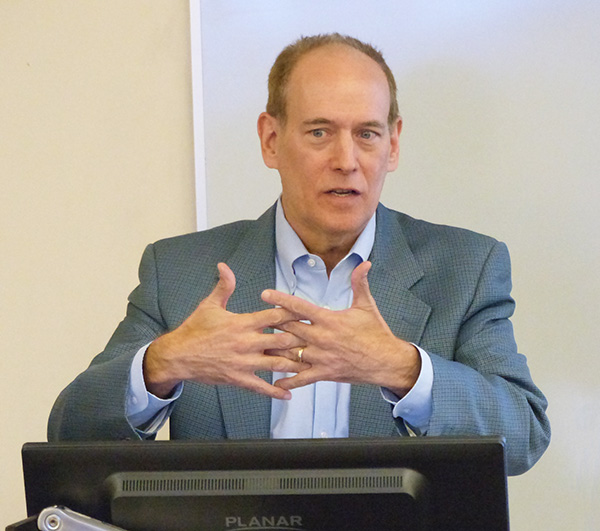How to Tackle Inequality at Its Roots

Opponents of tax-and-spend policies to support the social safety net and reduce economic inequality often attack them as an unfair taking. Why, the argument goes, should the government redistribute wealth to benefit poor and marginalized members of our society?
Steven Vogel, director of the Political Economy Program, the Il Han New Professor of Asian Studies, and a professor of political science and political economy at the University of California, Berkeley, argues in favor of such redistribution. But he also argues for more policies in line with what Jacob S. Hacker, Stanley Resor Professor of Political Science at Yale, has called “predistribution,” measures aimed to address the root causes of economic inequality.
“One argument against redistribution is that it can reinforce a status hierarchy that can demean the recipients, making them feel like helpless victims of the market system,” Vogel said. “Predistribution is more respectful of human dignity because it favors fair wages and fair value over government aid.”
Hacker invited Vogel to the Institution for Social and Policy Studies last month as a guest of the American Political Economy eXchange (APEX) to preview and gather feedback on a paper exploring the benefits of improving and expanding predistributive policies. APEX at ISPS, directed by Hacker, is also part of the Consortium on American Political Economy (CAPE), founded in 2020 with the support of the Hewlett Foundation.
“At APEX, we seek a deeper understanding of how markets and government interact in our democracy,” Hacker said. “Nothing gets at the heart of this dynamic more than how we address economic inequality and insecurity. And Steve’s latest contribution to this debate delves into when and how government might intervene, through progressive taxes and public social programs but also through policies that rebalance economic power and make markets work better for workers.”
Vogel argued that while necessary, redistribution often deals with symptoms rather than the causes of inequality. On the other hand, he said predistributive polices such as improving education, enforcing fair labor practices, and regulating markets to prevent monopolies can create a more effective and sustainable level playing field where everyone has a fair chance to succeed.
He said that market rules are never neutral because they always reflect a balance of power between different economic actors.
“Predistribution strives to create more just institutions, not just to fix the rules,” Vogel said. “Market power is a source of political power, and political power is a source of market power. Addressing imbalances, like those created by big tech or other huge corporations, enhances democracy. It can lead to a more representative and responsive government.”
Vogel said that by investing in education and job training programs, government can help to ensure that everyone has the skills they need to compete in the job market. By protecting workers’ rights and raising the minimum wage, government can directly increase household incomes. By enforcing antitrust laws, government can ensure competitive markets to increase innovation, lower prices, and improve product and service quality.
“Predistribution may be more politically feasible because it can be less costly and more effective than redistribution,” Vogel said.
At the same time, he recognized that powerful interests that benefit from the current system would resist changes that threaten their position. He said that some economists argue that redistribution is more efficient because it directly addresses inequality through taxes and transfers. And that trying to reshape markets can be complex and may not always yield the desired outcomes.
Vogel argued in favor of seeking equality of outcomes and not just equal opportunity, calling for both predistribution and redistribution strategies. He recounted President Franklin Roosevelt’s New Deal, which involved massive public works investments and fundamental market reforms that reestablished confidence in the economy. But after World War II, the focus shifted to redistribution and a gradual erosion in the power of labor through inaction, he said.
Vogel argued that the United States should eliminate policies of upward redistribution, prioritize public investment to achieve substantive equality of opportunity, reform market governance to balance economic and political power, favor predistribution policies with redistributive effects, and favor redistribution policies with predistributive effects.
“Social behavior doesn’t change that easily,” Vogel said. “To try to get at the root of the problem, we need to be more ambitious. Focusing only on redistribution sets the bar too low.”